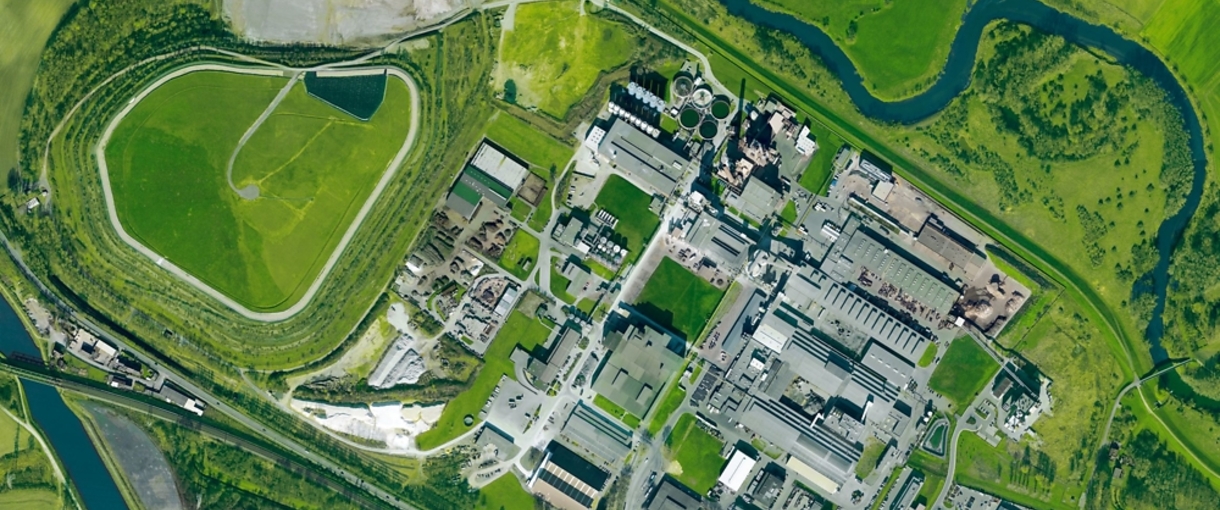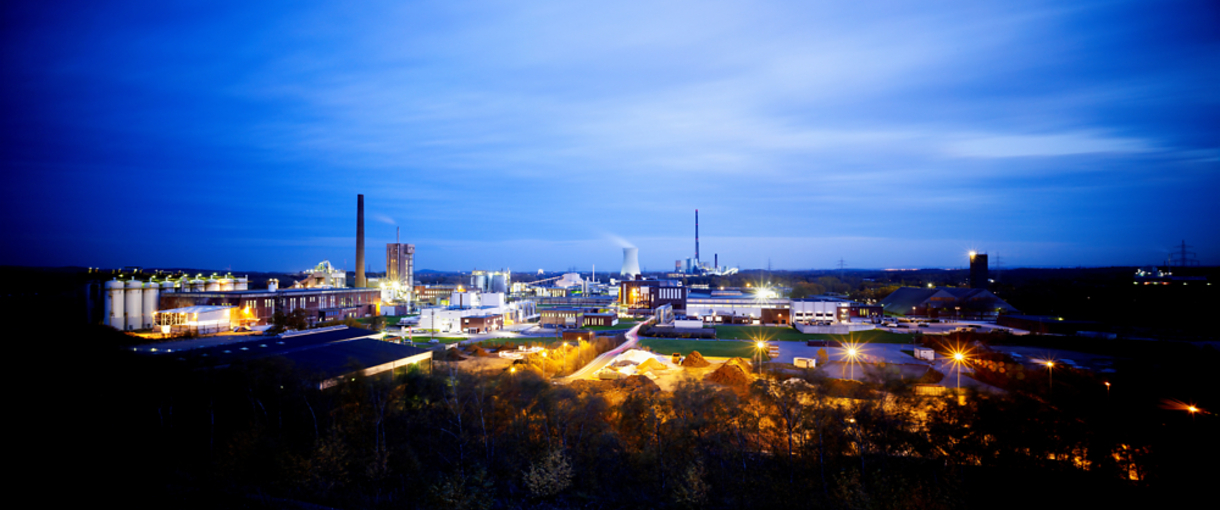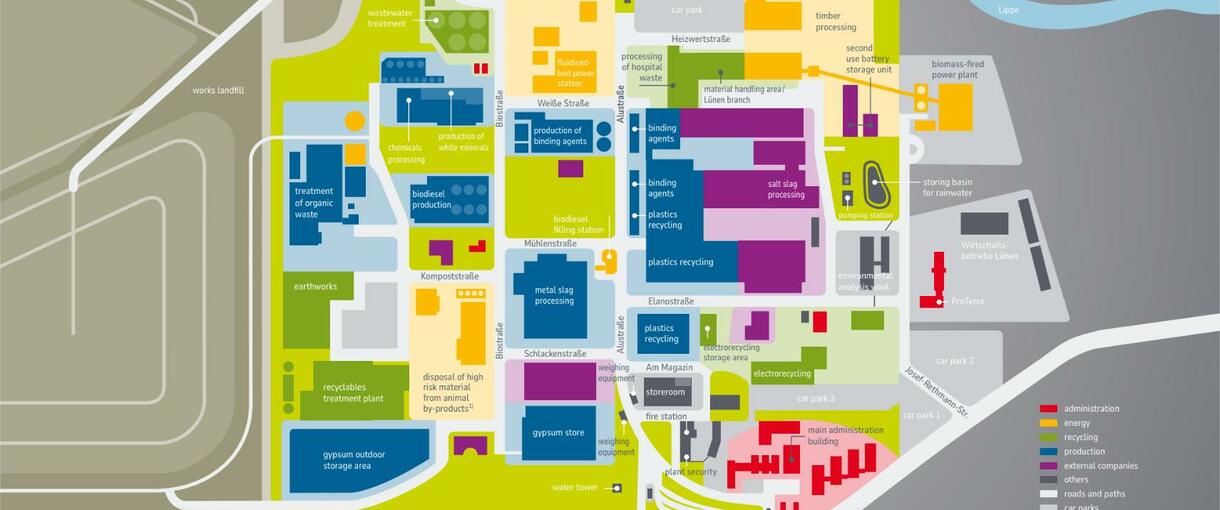REMONDIS' Lippe Plant
Contact
Dr. Georg F. L. Wießmeier
Gunther Neumann
Location
About REMONDIS' Lippe Plant
REMONDIS' Lippe Plant is not only the largest industrial recycling centre in Europe, it is also an excellent example of successful structural change. Originally an aluminium plant back in the 30s, the recycling park in Lünen is now home to a range of different facilities to recover a whole variety of recyclable substances as well as to produce high quality recycled raw materials. Today, over 1,600 employees work at the plant, where 1.4 million tonnes of residual materials are recycled annually, and approximately 0.9 million tonnes are returned to the industry as raw materials. The Lippe Plant plays a major role in helping to protect the environment and curb global warming – with various recycling activities at the site reducing carbon emissions by 488,000 tonnes each year. Additionally, a majority of the original aluminium plant buildings are still being used today and provide a perfect example of sustainability in action.
The REMONDIS-Group is one of the world's leading recycling, service and water companies. Through branch offices and shares in other companies REMONDIS is present in over 30 countries on three continents and operates in a wide range of business fields: it recovers raw materials from waste, develops innovative recycled products, offers alternative fuels and plays an important role in the water management sector supplying water and treating wastewater.
Timeline of Milestones
1934: Josef Rethmann acquires a small haulage company, marking the foundation of the RETHMANN Group as a familiy business.
1993: Acquisition of “Vereinigte Aluminium-Werke AG“ and establishment of the REMONDIS‘ Lippe Plant. The takeover includes activities of the fluidised-bed furnace as well as the “Umwelt Control Labor“ (environmental analytical laboratory). Besides this, the activities of metal slag processing, timber processing and plastics recycling are introduced.
1996: Launch of organic waste treatment facilities.
2003: Introduction of high-risk animal by-product disposal systems.
2005: Start of binding agents, white minerals and sodium aluminate production.
2006: Biodiesel production, WEEE recycling and biomass-fired power plant operations begin.
2008: New construction of the “Umwelt Control Labor“ (environmental analytical laboratory).
2014: Establishment of the medical waste transfer center.
2015: Introduction of second-use battery storage unit.
2017: Upgrades to organic waste treatment facilities.
2020: Enhancements to medical waste transfer center.
2022: Upgrade to WEEE recycling activities.
2023: Opening of a mixed waste sorting facility.
Looking ahead
The REMONDIS‘ Lippe Plant highlights the potential of industrial recycling. Its ongoing developments set a benchmark for sustainability, demonstrating how industrial operations can align with global environmental goals.
Area
| Total | 230.0 hectare |
|---|---|
| Free | n.a. |
Infrastructure and Connectivity
| Highway | yes | The REMODIS' Lippe Plant allows easy access to the highway (A2) |
|---|---|---|
| Railway | no | |
| Waterway | no | |
| Sea harbor | no |
Compounds
All the activities at the Lippe Plant have the same goal: to recover raw materials for reuse in order to conserve natural resources and curb climate change. The following list summarizes our activities/products:
- metals (primarily copper) from metal slag processing
- compost and bio-methane from treatment of organic waste
- biodiesel from animal fats and old cooking oils
- binding agents out of gypsum from flue gas desulpurisation systems at power stations
- sodium aluminate from industrial aluminium alkaline solutions
- white minerals from sodium aluminate
- plastic pellets from plastics recycling
- polyurethane, plastics, ferrous metal and non-ferrous metal from the recycling of discarded cooling and freezing appliances
Services
- administrational services
- processing of high risk animal by-products
- transfer centre for medical waste
- laboratory services by the “Umwelt Control Labor”
- sorting of mixed waste
- sterilisation of infectious waste
Power grid
The job of our fluidised-bed power station is to make the very most of non-recyclable residual materials. By incinerating waste, the power station is able to supply the various facilities at the site with electricity, process steam and compressed air. But that's not all: any excess electricity is fed into the grid, helping to supply the region with the energy it needs.
The Lippe Plant's biomass fired power plant supplies over 40,000 households with green electricity. The input material is old wood, which first undergoes a multi-stage process at the site's own facility to transform it into a fuel. The special feature of the biomass-fired power plant is that the production of electricity is completely carbon-neutral. The reason for this is that the amount of CO2 released into the atmosphere when the wood is incinerated ist the same as that absorbed by the tree from which the timber was made.
Our second-use battery storage unit contains a total of 1,000 batteries. Therefore, it is able to store enough energy to switch on all the street lamps in a city with a million of inhabitants such as Cologne. This is possible because the discarded batteries are still able to store a large amount of energy.
Companies on this park
News
A circular economy pioneer
REMONDIS' Lippe Plant →Founded back in 1991, RETERRA has transformed itself from a regional composting business into a nationwide biomass management specialist.





















